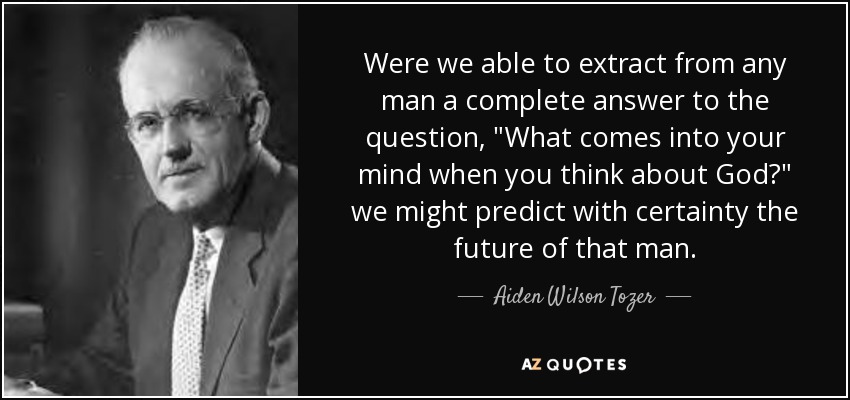Click here to return to Blog Post Intro
The Apostles’ Creed: A Guide to the Ancient Catechism by Ben Myers

An early third-century document known as the Apostolic Tradition points to the ancient roots of the Apostles’ Creed. The creed is a pledge of allegiance to the God of the gospel—a God who is revealed as Father, Son, and Holy Spirit; a God who is present to us in the real world of human flesh, creating, redeeming, and sanctifying us for good works.
Later generations of believers sometimes said that each of the twelve apostles had written one line of the creed—hence the name “Apostles’ Creed.” It is a charming legend that coveys a deep truth: that the baptismal confession is rooted in the faith of the apostles, and ultimately in the word of the risen Christ himself.
Even today the creed provides a framework—strong yet surprisingly flexible—for Christian thinking and Christian commitment.
The Apostles’ Creed: Together We Believe by Matt Chandler
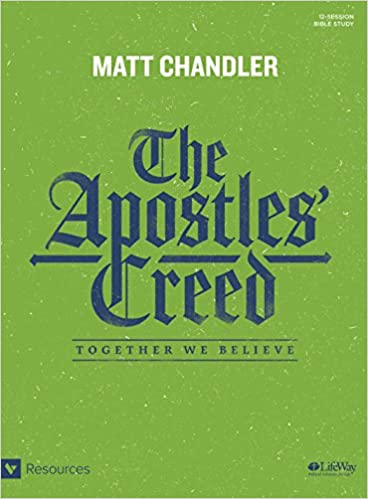
Finding its genesis in the apostles’ teachings, the Apostles’ Creed contains essential Christian doctrines and beliefs that summarize the gospel and make up the foundation of our faith.
Consider these four areas of focus and application for the Creed:
1. Symmetry: The creed helps us develop better symmetry as Christians, giving us a more robust understanding of biblical teaching. As Christians, it’s easy to stick with what we already know, and the creed helps us intentionally cover the doctrinal spectrum. Think of it like an exercise routine. A Christian who settles for believing in Jesus as Savior but never develops a love for the church is out of balance and ultimately unhealthy.
2. Clarity: The creed helps us with clarity, making clear who God is. The Christian life isn’t about our preferences or opinions or the latest cultural trends. It’s about God. What you believe about God is the most important thing in your life; it shapes all your attitudes and actions.
3. Community: The creed informs our community, whom we belong to, and whom we’re with. The creed shows us what’s primary in the Christian faith. We’re a creedal people, united by truth that supersedes any other differences in our culture and sets us apart as a distinct community of faith.
4. Counsel: The creed informs the way we counsel ourselves and others. How do you think and act differently? What do you tell yourself or others as a result of believing the doctrines in the creed?
Even in today’s society, which celebrates individuality and innovation, there’s still nothing that compares to the energy, commitment, and reverence generated by a united community, group celebration, and proud tradition.
While creeds do not hold any authority in and of themselves, they point outside themselves to the ultimate authority of the Word of God.
The Apostles’ Creed has been used both to correct error and as a tool in the spiritual formation of God’s people. The creed is more than just an individual statement; it’s both personal and corporate.

Humans are made for community, and that’s why the creed is confessed together by the entire believing community.
Affirming the Apostles’ Creed by J. I. Packer
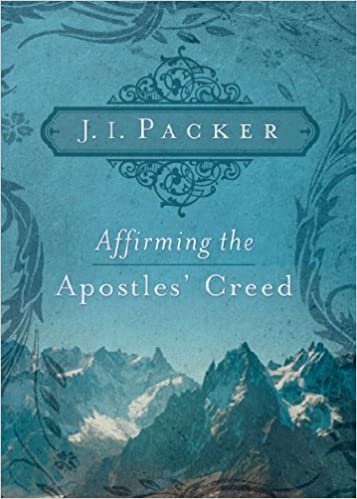
Many Christians used to call this Creed “the Belief.” What do we learn from the Creed as we study it? We learn to believe in…
- God the Father, who made me and all the world
- God the Son, who redeemed me and all mankind
- God the Holy Ghost, who sanctified me and all the elect people of God
When one has learned this much, one is not far from God’s kingdom. The purpose of knowledge is that we might apply it to life.
In the interests of memorable simplicity, evangelists, tract writers, youth workers, and others boiled down the gospel to an ABC as follows:
- All have sinned and come short of the glory of God, you included.
- Believe on the Lord Jesus Christ, and you will be saved.
- Confess Jesus Christ as the risen Lord, and he will in due course welcome you into heaven.
This presents a truncated version of the gospel message, presenting Christ the Redeemer apart from God the Creator, and remission of sins apart from personal regeneration, and individual salvation apart from life and worship in the church, and the hope of heaven apart from the pilgrim path of holiness—which is what in practice the ABC approach does—becomes a misrepresentation, one that sows the seed of many pastoral problems down the road.
It should be noted that The Creed itself was born as an instrument of evangelism.
The doctrinal ground that the Creed covered can be depicted as this syllabus:
- The Trinity.
- The Creation.
- The Incarnation.
- The Holy Spirit.
- The Church: The community of believers living through God and to God, the Father and the Son, in a sustained pattern of worship, work, and witness.
- The Forgiveness of Sins.
- The Christian Hope.
The Apostles’ Creed: Discovering Authentic Christianity in an Age of Counterfeits by R. Albert Mohler, Jr.
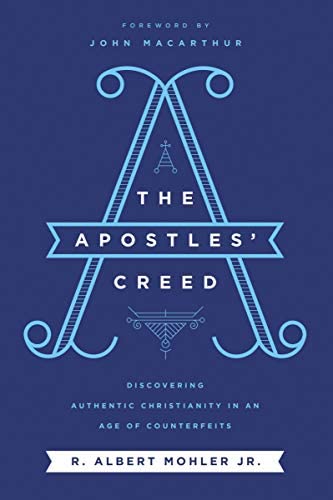
John MacArthur wrote, “(The Creed) is the basis of Christian unity.”
As Mark 9:24 says, “I believe; help my unbelief!” This ancient confession of faith—The Creed—is Christianity itself. This is what Christians believe—what all Christians believe. This creed is a summary of what the Bible teaches, a narrative of God’s redemptive love, and a concise statement of basic Christianity.
Mohler explained, “All Christians believe more than is contained in the Apostles’ Creed, but none can believe less.”
Where do we turn in order to know how to believe and what to believe? We turn first, of course, to the Bible, the very Word of God.
Why do we need to consider the Apostles’ Creed today? We need a summary of what the Bible teaches, and the church needs a strong standard for recognizing true Christianity and rejecting false doctrines.
Consider these seven reasons why the Apostles’ Creed is useful and necessary in the life of the church:
- Creeds define the truth. Jesus Christ told his disciples, “And you will know the truth, and the truth will set you free” (John 8:32).
- Creeds correct error.
- Creeds provide rules and standards for God’s people. The Apostles’ Creed functions as a guardrail for our teaching and instruction.
- Creeds teach the church how to worship and confess the faith.
- Creeds connect us to the faith of our fathers. The late historical theologian Jaroslav Pelikan wrote, “Tradition is the living faith of the dead, traditionalism is the dead faith of the living.”
- Creeds summarize the faith. No creed or statement of faith can replace the Scriptures, but they seek to summarize its content into succinct statements in order to equip Christians with brief yet crucial distillations of the faith.
- Creeds define true Christian unity. True Christian unity is unity in the truth revealed by Christ, not unity at the expense of truth, as is becoming all too common. The Apostles’ Creed does not confess some lowest-common-denominator form of Christian truth. It boldly confesses the grandeur of authentic Christianity in a series of powerful statements of Christian belief.
Apostles’ Creed by Alister McGrath
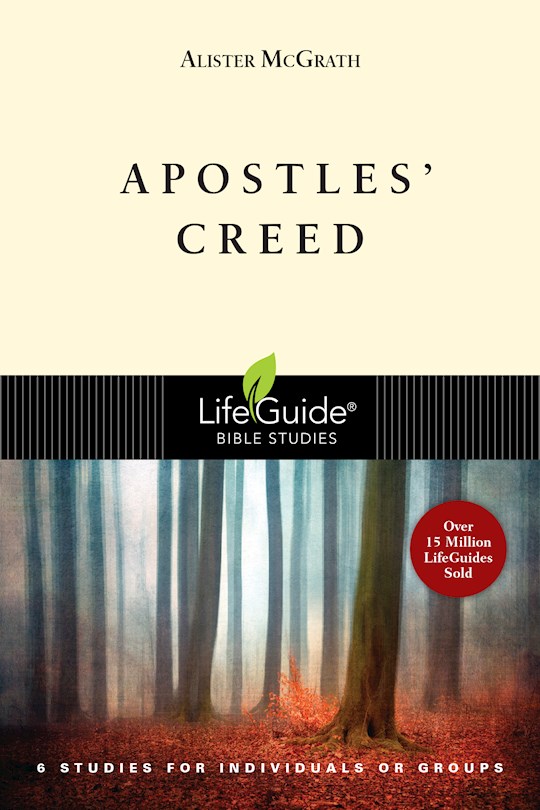
The Apostles’ Creed is an attempt to summarize the main points of what Christians believe. It should be noted that the earliest Christian creed seems to have been simply “Jesus is Lord.” As time went on, it became necessary to explain what Christians believed in more detail.
By the fourth century, the Apostles’ Creed as we now know it had assumed a more or less fixed form, so the Apostles’ Creed forms a central element of our common Christian heritage. It is an affirmation of the basic beliefs that unite Christians throughout the world, and across the centuries.
In our own day and age, the Apostles’ Creed serves three main purposes:
- Provides a brief summary of Christian faith. You do not become a Christian by reciting a creed; rather, the creed provides a useful summary of the main points of your faith.
- Allows us to recognize and avoid inadequate or incomplete versions of Christianity.
- Emphasizes that to believe is to belong. To become a Christian is to enter a community of faith. By putting your faith in Jesus Christ, you have become a member of his body, the church, which uses this creed to express its faith.


